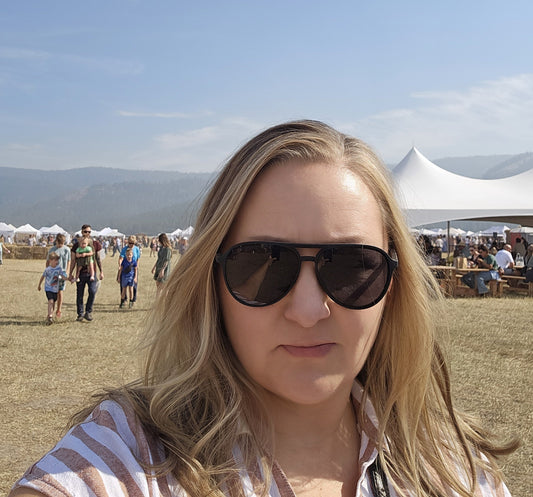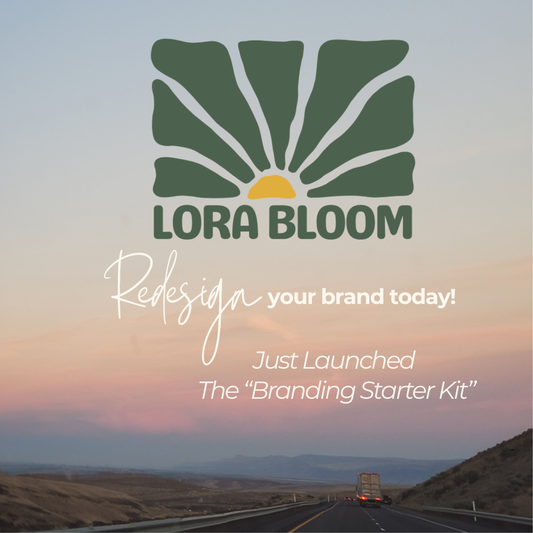If you've been keeping up with my updates on social media, you probably already heard that Lora Bloom has shifted gears. Starting out as a start-up mobile app company in 2019 turned online floral marketplace in 2020, has slowly evolved into a small business consulting business. Without retelling the whole story, Lora has evolved just like all businesses in post-Covid times. It's a new time and my business objectives have shifted in more relevant ways. I considered building out a whole new brand for the consulting side but decided against it. It would have taken time to develop. Since LoraBloom.com wasn't being used, I realigned the services to fit today. Besides, Lora has always been about empowering businesses and will remain as such.
Stumbling onto consultation last fall, I discovered I loved it. I have learned so much over my decade long experience as a small business owner. But I'm not going to lie, it's been downright painful at times. I've shed lots of tears over the years and seen a lot of people come and go within the floral industry, especially during Covid times. Consulting another business gives me an opportunity to help someone else and share the knowledge learned over the years.
Get Scrappy
I've always been a bit of a risk-taker but a cautious one. And, I'm scrappy! I figured out how to piece together pop-ups and social events with very little marketing dollars. This is where my marketing background came in handy. I didn't spend beyond what I had. If I did, what was the return on investment going to turn into? Here's a painful story I learned early on.
Within the first year or so of business, a Seattle based wine distributor company invited me to a unique wine tasting event for their wine club members. Aside from tasting and buying bottles of wine, the company invited a handful of other local businesses to set up an indoor market for a small nominal fee. I can't remember all the businesses there, but we had to sell something. (I do recall Glassy Baby being there.) The building was trendy, with mood lighting and a DJ in the SoDo District. I made the most of my space. Bold lighting, a variety of beautiful flowers, including expensive peonies, and lots of handmade bouquets to sell. It looked awesome. I was excited and honored to be invited! Even my best friend came to show support. But let me tell you, it was actually horrible! For probably two to three hours, I watched people drink and laugh, look over at me, stroll by to admire the flowers and maybe sell $50 when I'd invested hundreds. I was counting down the minutes and fighting off tears. It was obvious no one was interested in shopping for flowers, and I felt horrible. Completely deflated; I had failed bigtime and lost precious funds. I even recall the event director coming over to buy flowers at the last minute. I know he made a "pity" bouquet purchase! I couldn't wait to get out of there!
At the time, I felt like such a fool. What a failure! I was a failure! How would I ever be successful in this business if I couldn't even sell flowers at a pop-up! In the end, I licked my wounds and moved on. Yet, as the years passed, I learned my failures weren't really failures at all. They were lessons. I went on to do more pop-ups, but I learned from that experience. Knowing your audience is important. Looking back, those wine members weren't focused on shopping for flowers. They were there to drink, have a good time and buy wine. I should have reframed my objective. The goal wasn't to sell flowers, it was to gain access to those members as new customers. It was about the flower services they might need in the future, like getting married or hosting corporate events. I should have had a drawing, gotten their emails or given the flowers away with my business card attached.

(Picture at the actual event, circa 2016. Can't believe I found this!)
Months later, I did another pop-up with BECU in Seattle. It was the same type of set-up. BECU hosted a members-only event to talk about banking services and invited lots of other member businesses to be there too. This time, I had a new strategy. I had a beautiful set up but gave away free stems of daffodils and tulips with my card attached to anyone who approached my table. People loved the flowers and were overjoyed to discover they could take home a free flower. This was actually an icebreaker, which opened up discussion of my business mission and services. Plus, I saved a lot of money. I didn't overspend or buy unnecessary product and took home names of potential customers in the future. In the end, I had done my research on who would be there, what the members might be looking for, and how I could spin the services I had to cater to their needs.

(An example of tagging each stem of flowers for customers to take home.)
Pro-Tip! Self-reflection in business is very important. After that BECU event, I reflected on what worked and what didn't. My takeaway from that pop-up was I wanted to get a little closer to home. Finding a customer base close to my business operations helped a variety of factors, like keeping expenses down and creating a target audience near my business. This would obviously vary depending on where someone had a business located, but it gets more expensive the further one must travel to do business. Especially today!
Do It Yourself
Much of my scrappiness comes in the form of DIY. I do it myself.
Now, I never want to tarnish the dream of a budding entrepreneur, but I do want to be honest and speak realistically. All these reality tv shows and business influencers out there can really jade the perception of starting and running a business. Designer clothing, tough girl poses and raining capital dollars is likely experienced by a very small percentage of start-ups. I dare say most people who start up businesses are scraping together a small amount of savings to begin in the first place. Careful calculations are crucial. It doesn't take long for those funds to disappear. Planning and careful research on ROI should be top of mind.
I have done so much by myself. With a little know-how of writing a business or marketing plan, a person can scrape together a lot on their own. In fact, there are so many online tools out there to help, with diligence and discipline, a business owner can be self-sufficient for a long time. It might be hard work and long hours, but it can be achieved.
Pro Tip! It's important to know when to hand certain aspects of the business off to a professional. For a year or two, I managed finances by myself. I had a Quickbooks Online account and thought I was operating it correctly. Wrong! One of the best things I've ever invested in is having a bookkeeper. In fact, I had to pay 1k+ to have my books corrected before a smooth system was established. Identify what you aren't good at or what you don't like doing in business. Invest in those areas first!
One of the areas I've excelled in is online sales. I learned early on that I love ecommerce. The very first site I created was on GoDaddy. I'll be perfectly honest. It was terrible. Now, this was back in the early days of online website templates, so I don't want to bash GoDaddy too much. It was a sign of the times. Most businesses were probably paying web developers to manage their sites.
At the time, I was in the midst of getting a marketing certificate at the University of Washington. I will never forget this story. Sitting with a group of classmates at The Ram Restaurant in Seattle, two gals in the class asked me about my business and mentioned how they looked at my site. I don't recall exactly how the conversation went, but they basically said my site was really bad and they could help. I was mortified. To be honest, I was testing the waters on this business. A lot of the work I started came from hitting the pavement. I went around to restaurants and asked about flower subscriptions. It was all word of mouth at that point. My site wasn't that significant. However, those comments hung with me thereafter. As I became more committed to my business, I felt I needed to invest in a new, state-of-the-art website.
Soon after, a friend referred someone who revamped my site on Weebly. It was a drastic improvement! It was also my first major investment of around $1,500. However, in that time, I learned how to update the site independently. Not changing the template; I regularly updated content to fit business needs throughout the year. I'm actually really good at design and flow. Never again would Tammy have a bad website!
Over the years, I've learned I actually really enjoy working on my site. I probably should have gone into web development a long time ago, but that's a different topic! Making a full conversion years ago, all my sites operate on Shopify. I'm a HUGE supporter of this platform. I have paid Shopify Experts for small features, but the fees were nominal and well worth it. Again, I don't do code!!
Wrap It Up!
I haven't thought about any of those stories, rather "lessons," for a long time. It's great to reflect on how far I've come. This is why I want to expand on consulting. I remember the roller coaster wave of emotions starting out and feeling so alone. It wasn't until I began to make a little florist community that I started to feel better. When I heard similar stories and experiences, I felt normal, like I wasn't the only one who had gone through something painful. This made a world of difference!!
If you are interested in one-on-one time talking about your business, reach out! I would love to talk and help you achieve your business goals! Send me an email and we'll get started! tammy@lorabloom.com





